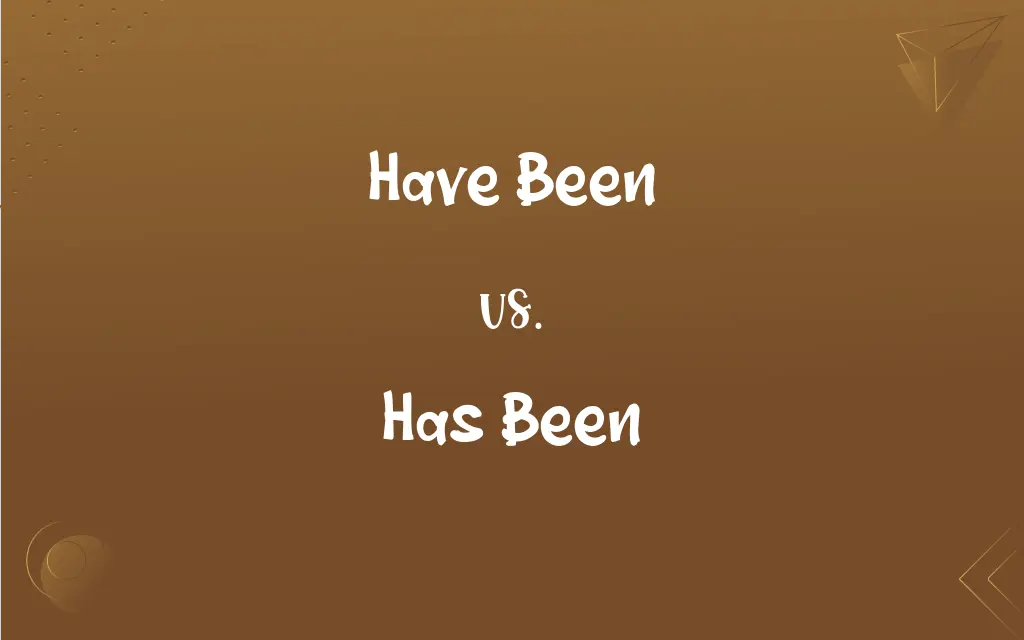Have Been vs. Has Been: What's the Difference?
By Janet White || Published on November 26, 2023
"Have been" is used with plural subjects or the pronouns I/you/we/they, while "has been" is used with singular third-person subjects.

Key Differences
Have been is the present perfect form used with plural subjects (e.g., we, they) and singular subjects I and you. While, has been is the form used with singular third-person subjects (e.g., he, she, it).
Have been indicates actions or states that started in the past and are still relevant now, or were relevant over a period, when talking about 'we', 'you', 'they', or 'I'. However, has been indicates the same but for 'he', 'she', or 'it'.
Have been is used to discuss experiences, changes, or ongoing situations in our lives or in the lives of plural subjects. Has been is used in similar contexts but refers to a single third-person subject.
Have been can also imply repeated actions or experiences when referring to 'I', 'you', 'we', or 'they'. Has been implies a similar meaning but pertains to individual subjects like 'he', 'she', or 'it'.
In interrogative and negative forms, have been is used with 'I', 'you', 'we', and 'they', such as “Have you been?” or “They haven't been.” Has been is used with 'he', 'she', 'it', as in “Has she been?” or “It hasn't been.”
ADVERTISEMENT
Comparison Chart
Subject Pronouns
I, you, we, they
He, she, it
Number
Plural and some singular
Singular only
Example Sentence
We have been studying.
She has been reading.
Use in Questions
Have you been to France?
Has he been to the park?
Use in Negative Sentences
They haven't been called.
It hasn't been confirmed.
ADVERTISEMENT
Have Been and Has Been Definitions
Have Been
Indicates an action or state continuing from past to present.
I have been working here for five years.
Has Been
Indicates an ongoing state or action from past to present.
He has been living in London since 2010.
Have Been
Refers to repeated actions or experiences.
They have been visiting that museum often.
Has Been
Present perfect form for 'he', 'she', 'it'.
She has been writing all afternoon.
Have Been
Present perfect form for 'I', 'you', 'we', 'they'.
We have been traveling for hours.
Has Been
Expresses individual experiences or accomplishments.
She has been awarded twice for her work.
Have Been
Expresses life experiences.
I have been to Spain three times.
Has Been
Used for singular subjects experiencing changes.
It has been getting colder each day.
Have Been
Used for describing changes over time.
You have been growing so fast.
Has Been
Describes a repeated action or habit.
He has been jogging every morning.
Has Been
One that is no longer famous, popular, successful, or useful.
Has Been
(pejorative) A person, especially one formerly popular or influential, who continues in their field after their popularity or effectiveness has peaked and is now in decline.
Has Been
Someone who is no longer popular
FAQs
When is 'has been' appropriate?
For singular third-person subjects like 'he', 'she', 'it'.
Is 'have been' used in passive constructions?
Yes, it's used in passive forms for plural and some singular subjects.
Can 'have been' refer to a completed action?
Yes, if the action's effects are still relevant.
When do you use 'have been'?
When referring to 'I', 'you', 'we', 'they'.
How do question forms differ with 'have been' and 'has been'?
“Have you been?” vs. “Has she been?”
Are there exceptions to these rules?
Generally no, these rules are quite consistent in English grammar.
How does context change the meaning of 'have been'?
The context can shift the time frame or emphasis on continuity.
Can 'has been' be used in passive voice?
Yes, for singular third-person subjects in passive constructions.
Does 'has been' always imply past action?
Mostly, but the effect or relevance is often present.
Does 'has been' imply continuity?
Yes, it often implies ongoing or past-to-present continuity.
How does tense change with 'have been' and 'has been'?
The tense is always present perfect with both.
Can 'have been' express hypotheticals?
Yes, in conditional or hypothetical constructions.
Can 'have been' and 'has been' be used interchangeably?
No, they're subject-specific.
Do these forms change in American vs. British English?
The usage is consistent in both American and British English.
How do negative forms work with 'have been' and 'has been'?
“They haven't been” vs. “He hasn't been.”
Is 'has been' used in formal writing?
Yes, it's common in both formal and informal writing.
What is the difference in time expression between the two?
Both express actions from the past continuing to the present, but for different subjects.
Are 'have been' and 'has been' common in spoken English?
Yes, they're frequently used in both spoken and written English.
How do these forms relate to past and present tenses?
They bridge past actions or states with present relevance.
Can 'have been' and 'has been' be used for future reference?
Indirectly, when implying future implications of present actions.
About Author
Written by
Janet WhiteJanet White has been an esteemed writer and blogger for Difference Wiki. Holding a Master's degree in Science and Medical Journalism from the prestigious Boston University, she has consistently demonstrated her expertise and passion for her field. When she's not immersed in her work, Janet relishes her time exercising, delving into a good book, and cherishing moments with friends and family.






































































